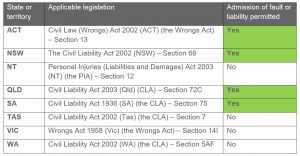Disclaimer: This article was published in 2023 and reflects the information available at that time.
Meridian Lawyers issue state and territory-specific guides
It’s OK to say sorry. Pharmacists are human beings and fallible, so despite their best efforts, adverse events and mistakes can still occur. A key component of managing an incident is offering a sincere apology when an incident occurs.
When dealing with an incident or complaint, no matter how trivial, time is of the essence. An irate customer who does not receive a prompt response may feel ignored and is more likely to escalate the complaint.
Why is it important to apologise?
It is widely accepted that apologies can have psychological benefits to a potential claimant. It can also assist in the early resolution of grievances between a practitioner or service provider. Apologies should therefore be made in instances where a patient has expressed concern following an adverse incident.
Apologising is also an important part of demonstrating insight which is something valued by the regulators, such as Ahpra and the Pharmacy Board of Australia (Board). Generally, it is considered by the regulators to be a good reflection upon a pharmacist if a genuine apology is made promptly in response to a concern. This is in line with Ahpra’s Shared Code of Conduct (applicable to pharmacists in all states and territories in Australia), which requires health practitioners to be open and honest in communication with patients who have been harmed by adverse events, apply the principles of open disclosure, listen to a patient’s concerns and acknowledge any distress.
What should you say?
Meridian Lawyers provide the following practical guidance on making an apology:
- Actively listen to the complaint and demonstrate that the concern is being taken seriously. This can be done by giving the patient or their carer an opportunity to explain how the incident has affected them and promptly responding to any complaint by ensuring the appropriate person responds to the concern. Depending on the circumstances, this may be done by the dispensing pharmacist or a senior person within the pharmacy, such as the pharmacy manager or the pharmacy’s proprietor.
- Express sympathy, regret and concern for the incident. In doing so, express care and focus on the ‘human response’. Avoid making an admission of liability or fault. Similarly, do not make mention of potential outcomes (such as compensation) or insurance as this may incite or encourage a claim.
- Use the word sorry. There is nothing wrong with using the word ‘sorry’. Ensure any expression is done empathically and sincerely. Some suggested wording includes: “I am very sorry to hear about this/I am very sorry that this happened. Please be assured that we take these issues seriously and your health and well-being are our priority. We will investigate this matter promptly so that we can understand how this happened and take steps to avoid any recurrence.’’
- Notify PDL. Ensure this is done as soon as possible so appropriate advice can be obtained.
Apologies and admissions of fault
Pharmacists may be concerned that making an apology may jeopardise their ability to defend claims or complaints made against them on the basis that the apology may be construed as an admission of guilt. Pharmacists will also be aware of the impact that an apology may have on their insurance policies as a result of non-admission of liability clauses within those policies. It is important to ensure that an apology is made in accordance with the applicable legislation to ensure that such clauses are not triggered.
Generally, apology laws aim to dissociate the act of making an apology from an admission of liability and are designed to enable the natural ‘human response’ of apologising. Each Australian state and territory has varying definitions of what constitutes an ‘apology’ in these circumstances. Apology laws share common features across jurisdictions but variations exist. The state and territory-specific guides developed by Meridian Lawyers provide more specific advice on the applicable legislation covering apologies in each jurisdiction and are available to download via the PDL member portal. They provide guidance on how to sincerely and genuinely offer an apology while minimising the risk of the apology being later used as an admission of fault or liability in claims for damages.
Summary of applicable state and territory regulations

It is also important to note that the legislation covering apologies may apply only to civil actions, and not to complaints made to a regulatory body such as Ahpra or the Board. These bodies may still take an admission of fault into account, even if it forms part of an apology. Care should also still be taken when making an apology to avoid an admission of fault where possible as this may still give strength to a patient in negotiating or commencing a claim.
What shouldn’t you say?
The apology laws are designed to encourage apologies, in the hope that it leads to complaints being de-escalated or to encourage the early resolution of disputes and avoidance of litigation.
Care should be taken when making an apology to a customer to ensure it fits within the relevant apology laws.
When apologising, express sympathy, regret and concern for the incident and the customer’s wellbeing. In doing so, avoid making an admission of liability or fault. Similarly, do not make mention of potential outcomes (such as compensation) or insurance as this may incite or encourage a claim.
PDL members can call 1300 854 838 for advice and incident support from one of our Professional Officers. Supporting our pharmacist members 24/7.



